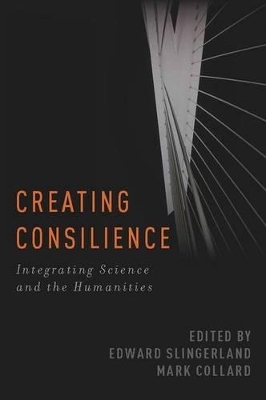
Creating Consilience
Oxford University Press Inc (Verlag)
978-0-19-979569-7 (ISBN)
Calls for a "consilient" or "vertically integrated" approach to the study of human mind and culture have, for the most part, been received by scholars in the humanities with either indifference or hostility. One reason for this is that consilience has often been framed as bringing the study of humanistic issues into line with the study of non-human phenomena, rather than as something to which humanists and scientists contribute equally. The other major reason that consilience has yet to catch on in the humanities is a dearth of compelling examples of the benefits of adopting a consilient approach. Creating Consilience is the product of a workshop that brought together internationally-renowned scholars from a variety of fields to address both of these issues. It includes representative pieces from workshop speakers and participants that examine how adopting such a consilient stance -- informed by cognitive science and grounded in evolutionary theory -- would concretely impact specific topics in the humanities, examining each topic in a manner that not only cuts across the humanities-natural science divide, but also across individual humanistic disciplines. By taking seriously the fact that science-humanities integration is a two-way exchange, this volume takes a new approach to bridging the cultures of science and the humanities. The editors and contributors formulate how to develop a new shared framework of consilience beyond mere interdisciplinarity, in a way that both sides can accept.
Edward Slinglerland is Associate Professor of Asian Studies, Canada Research Chair in Chinese Thought and Embodied Cognition, University of British Columbia. Mark Collard is Associate Professor and Canada Research Chair in Human Evolutionary Studies, Simon Fraser University
Introduction ; Edward Slingerland and Mark Collard Creating Consilience: Toward a Second Wave ; Part I: Theoretical Issues ; Section One: Ontologies for the Human ; Ch. 1The humanities and human nature ; Ch. 2 The meta-physical realities of the un-physical sciences: Why vertical integration seems un-realistic to ontological pluralists ; Ch. 3 Mind-body dualism and the two cultures ; Ch. 4 On the psychological origins of dualism: Dual-process cognition and the explanatory gap ; Section Two: Consilience Through The Lens of Anthropology ; Ch. 5 From studious irrelevancy to consilient knowledge: Modes of scholarship and cultural anthropology ; Ch. 6 Whence and whither sociocultural anthropology ; Ch. 7 Unconsilience: Rethinking the two-cultures conundrum in anthropology ; Part II: Case Studies ; Section Three: Culture ; Ch. 8 Culture in songbirds and its contribution toward the evolution of new species ; Ch. 9 When does psychology drive culture? ; Ch. 10 Quantifying the importance of motifs on Attic
| Reihe/Serie | New Directions in Cognitive Science |
|---|---|
| Verlagsort | New York |
| Sprache | englisch |
| Maße | 152 x 231 mm |
| Gewicht | 635 g |
| Themenwelt | Geisteswissenschaften ► Philosophie ► Ethik |
| Geisteswissenschaften ► Psychologie ► Verhaltenstherapie | |
| Geisteswissenschaften ► Religion / Theologie | |
| Naturwissenschaften | |
| Sozialwissenschaften | |
| ISBN-10 | 0-19-979569-X / 019979569X |
| ISBN-13 | 978-0-19-979569-7 / 9780199795697 |
| Zustand | Neuware |
| Informationen gemäß Produktsicherheitsverordnung (GPSR) | |
| Haben Sie eine Frage zum Produkt? |
aus dem Bereich


